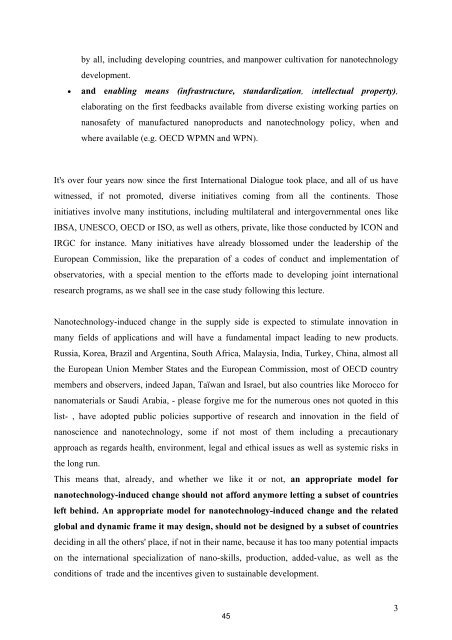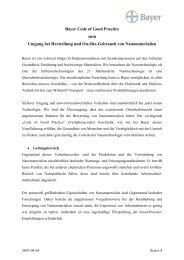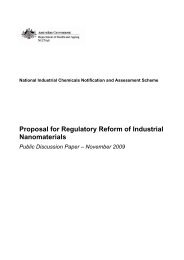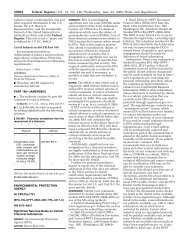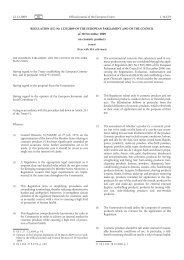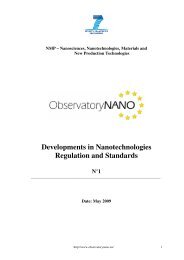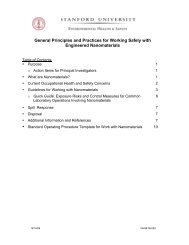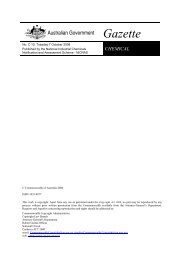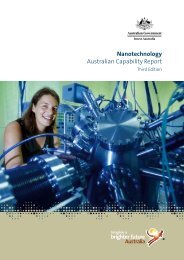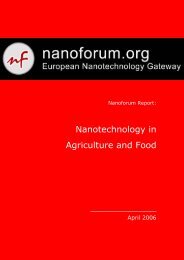Nanotechnology - Nanotech Regulatory Document Archive - Arizona ...
Nanotechnology - Nanotech Regulatory Document Archive - Arizona ...
Nanotechnology - Nanotech Regulatory Document Archive - Arizona ...
Create successful ePaper yourself
Turn your PDF publications into a flip-book with our unique Google optimized e-Paper software.
y all, including developing countries, and manpower cultivation for nanotechnology<br />
development.<br />
• and enabling means (infrastructure, standardization, intellectual property),<br />
elaborating on the first feedbacks available from diverse existing working parties on<br />
nanosafety of manufactured nanoproducts and nanotechnology policy, when and<br />
where available (e.g. OECD WPMN and WPN).<br />
It's over four years now since the first International Dialogue took place, and all of us have<br />
witnessed, if not promoted, diverse initiatives coming from all the continents. Those<br />
initiatives involve many institutions, including multilateral and intergovernmental ones like<br />
IBSA, UNESCO, OECD or ISO, as well as others, private, like those conducted by ICON and<br />
IRGC for instance. Many initiatives have already blossomed under the leadership of the<br />
European Commission, like the preparation of a codes of conduct and implementation of<br />
observatories, with a special mention to the efforts made to developing joint international<br />
research programs, as we shall see in the case study following this lecture.<br />
<strong><strong>Nanotech</strong>nology</strong>-induced change in the supply side is expected to stimulate innovation in<br />
many fields of applications and will have a fundamental impact leading to new products.<br />
Russia, Korea, Brazil and Argentina, South Africa, Malaysia, India, Turkey, China, almost all<br />
the European Union Member States and the European Commission, most of OECD country<br />
members and observers, indeed Japan, Taïwan and Israel, but also countries like Morocco for<br />
nanomaterials or Saudi Arabia, - please forgive me for the numerous ones not quoted in this<br />
list- , have adopted public policies supportive of research and innovation in the field of<br />
nanoscience and nanotechnology, some if not most of them including a precautionary<br />
approach as regards health, environment, legal and ethical issues as well as systemic risks in<br />
the long run.<br />
This means that, already, and whether we like it or not, an appropriate model for<br />
nanotechnology-induced change should not afford anymore letting a subset of countries<br />
left behind. An appropriate model for nanotechnology-induced change and the related<br />
global and dynamic frame it may design, should not be designed by a subset of countries<br />
deciding in all the others' place, if not in their name, because it has too many potential impacts<br />
on the international specialization of nano-skills, production, added-value, as well as the<br />
conditions of trade and the incentives given to sustainable development.<br />
45<br />
3


